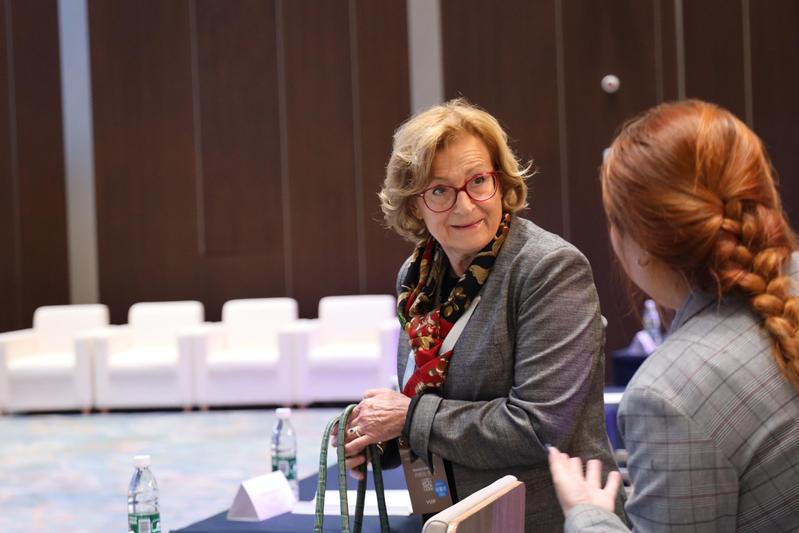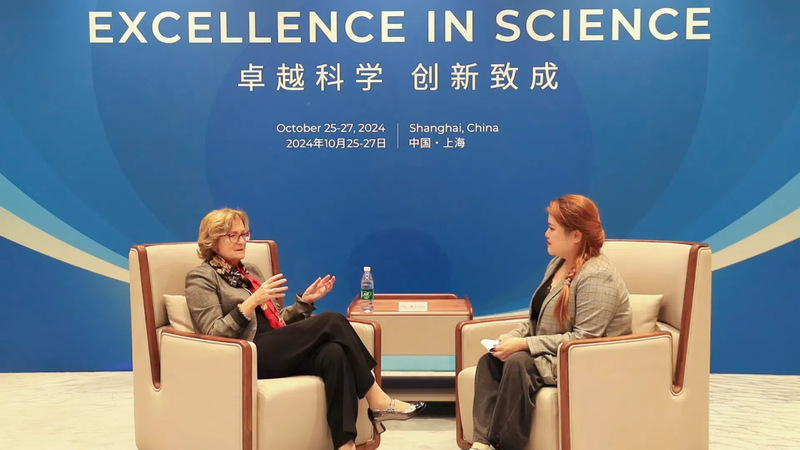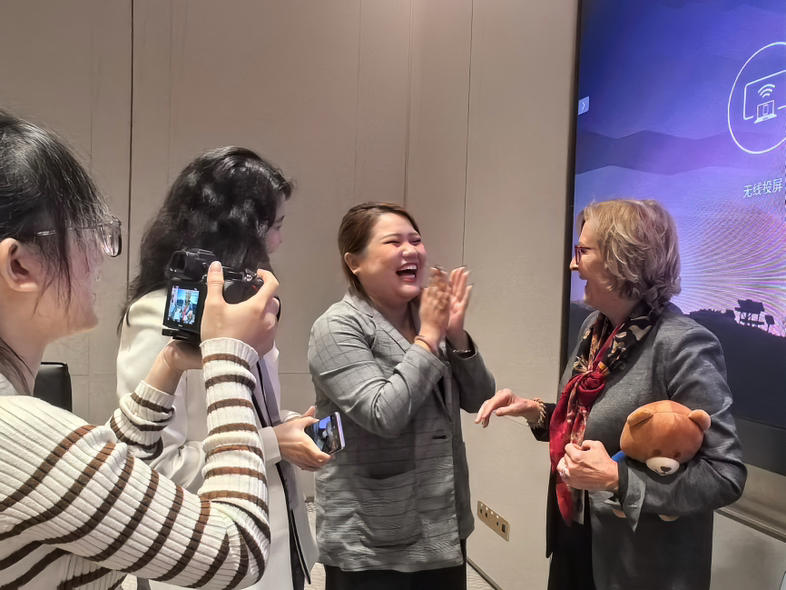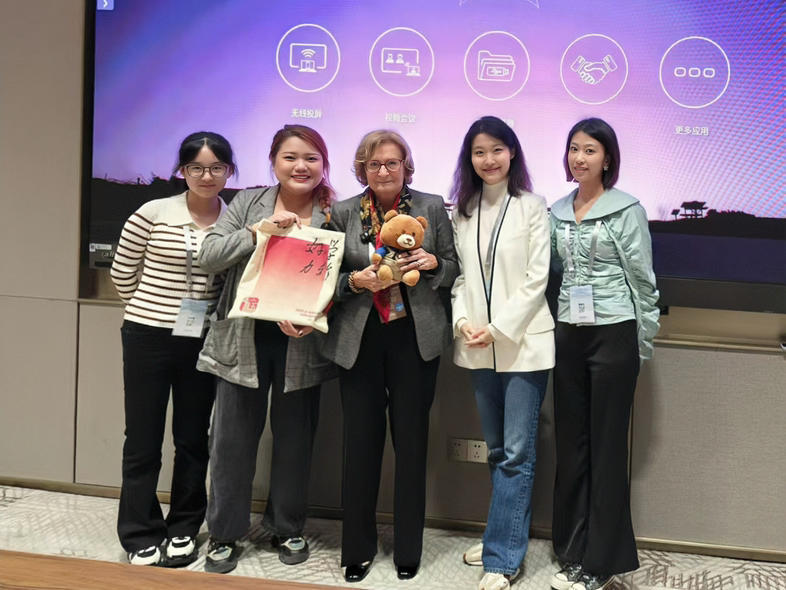By Dong Jiayi, Guo Xingru, Zhang Huiying
On a misty October morning in Shanghai, light rain fell as a elegant woman strode confidently into Sinan Hall at the Lingang Center. With a stylish handbag on her arm and oversized burgundy glasses framing her face, Daniela Rhodes radiated energy.
Rhodes still wore the distinctive gold bracelet she donned at last year’s WLA Prize Award ceremony. She found the piece in an antique store window. It was made the year Watson and Crick won the Nobel Prize for discovering DNA’s double-helix structure, she explained. So I had to buy it.
In 2023, Rhodes was honored with the WLA Prize for elucidating the atomic structure of the nucleosome, which provided a theoretical foundation for understanding the mechanisms of chromatin, gene regulation, and epigenetic inheritance.
This visit to Shanghai marked Rhodes' third trip to China and her second appearance at the WLA Forum. Much like the intricate folding of chromosomes to form DNA, this exclusive interview also interwove together Rhodes' experiences across various times and spaces.

Rhodes is interviewed by People’s Daily. (Photo provided to People's Daily)
Giving youth time
The responsibilities and pressures on young scientists are increasing, Rhodes remarked, expressing her admiration for the Young Scientists Forum she attended the day before.
Learning that some young scientists spent only 10 to 20 percent of their time on actual scientific research, she emphasized, Young scientists should be given more time and security to pursue rigorous research and tackle the most challenging questions.
The MRC Laboratory of Molecular Biology in Cambridge, England, where Rhodes spent 40 years, fosters a relaxed scientific environment that promotes innovation. Scientists are encouraged to explore topics that interest them, allowing for the investigation of any significant question. This philosophy has led to 13 Nobel Prizes, Rhodes noted.
In the last two decades of her career, Rhodes became particularly fascinated by telomeres.
Following the discovery of monoclonal antibodies by Rhodes’ colleague César Milstein, scientists in the lab began exploring potential avenues for developing a cancer cure.
How does the human body produce such a wide variety of antibodies from just a few genes? This fundamental question paved the way for the discovery of monoclonal antibodies, which subsequently fueled advances in targeting specific cancer proteins. Solving this intricate problem took about 20 years, and Rhodes endeavored to condense the explanation into just 20 seconds for us.
She compared telomeres to a cap that shields chromosomes from information loss or damage, noting that, naturally, telomeres shorten progressively as we age.
An interesting paradox suggests that telomeres may be a gift which human body couldn’t handle. The cause of 90% of human cancers is the reactivation of telomerase, leading to indefinite proliferation and immortality of cancer cells. Many researchers are trying to find ways to switch off telomerase, but doing so would also halt the growth of stem cells, Rhodes explained.
Brains versus computers
I think all young people want to be saved by computers. Rhodes humorously commented, prompting a chorus of understanding laughter.
In 2024, the Nobel Prize in chemistry was awarded to Demis Hassabis and John Jumper for realizing a 50-year dream: using AI models to predict the complex structures of proteins. As artificial intelligence continues to shape the landscape of scientific research, Rhodes has keenly felt its impact.
While enjoying lunch the day before, Rhodes listened to Jon Kleinberg and Michael I. Jordan discuss the applications of AI across various fields. She was reminded of her former colleague Michael Levitt, who received the Nobel Prize in the 20th century for his pioneering work using computers to study proteins folding.
Rhodes recognized the importance of collaboration, stating, In the lab, sometimes the simplest way to collaborate is just to push open the door to the next office. She added, The most significant and rapid advancements occur when biochemists and engineers work together. You may have a compelling problem, but someone needs to program it with a computer.
As a lifelong structural biologist focused on basic research, Rhodes firmly believed in the primacy of human intelligence. She references AlphaFold, an artificial intelligence program developed by DeepMind, a subsidiary of Alphabet. You see, AlphaFold's predictions of protein-molecule relationships are made possible, only because scientists like me already determined the three-dimensional structures of proteins. she explained. In science, it’s essential to ask the right questions. That's why our brains are more important than any computer.
Rhodes has consistently pushed boundaries: winning math awards for six years while dreaming of becoming an artist at 19; leaving a Nobel Foundation affiliate to work as a hospital janitor; applying to an architectural design program and switching to chemical engineering; becoming a junior engineer accidentally but falling in love with science due to an electron-density map. Rather than following a conventional path, Rhodes has continually sought to deepen her understanding of the world, dedicating herself to that journey.
Open your vision, Rhodes said to young people who may read this. If you need to pursue something, do it in a way that feels right for you. Don't let your parents’ expectations or the idea of a shortcut to your career limit you. The best strategy is to embrace change rather than rushing to reach your destination in the shortest time.

Rhodes is interviewed by People’s Daily. (Photo provided to People's Daily)
A note for women
When discussing the dress code, Rhodes laughed and said, They say I'm too elegant to be a scientist. In fact, her elegance shows not only in the perfectly groomed blonde hair, but also in her unhurried stride.
In 1976, Rhodes' first child, James, was born. In the same year, she also achieved a significant milestone by successfully crystallizing the first natural nucleosome at LMB. That summer marked two crystals in her life: of love, and of science.
For Rhodes, life and work complement each other like the perfect double helix structure of DNA. It was only after the birth of her son that she decided to pursue a doctorate. I thought I should have a career, as I might be responsible for him myself one day, she reflected. As a new mother, she kept her mind active and learned to focus on what truly mattered. I've often said that one doesn't have to be in a lab to think, Rhodes said.
As co-chair of the 2024 WLA’s She Forum, Rhodes is acutely aware of the challenges women face in research and the workforce. Although she previously felt frustrated by the disparity in recognition compared to her male colleagues, she has learned to transcend those feelings. By prioritizing constructive solutions and minimizing complaints, she consciously stepped away from the role of a victim.
In 1974, Rhodes' paper was published in Nature, where she noticed a striking pattern: Men's bylines featured their initials and last names, while women's included full spellings, making it easier for readers to identify the author's gender. If you're A. Klug, I want to be D. Rhodes, she said to her mentor, Aaron Klug. Three years later, another paper by Rhodes appeared in Nature, this time signed as D. Rhodes.
The wisdom of life lies in recognizing and appreciating differences. As Rhodes’ achievements gained broader recognition, she became increasingly aware of the distinctions she faced when entering a room filled with men. The key, she emphasized, is to choose what is right for oneself, enjoying the freedom of choice without succumbing to by outside expectations. Women don't need to mimic or masquerade as men; they should simply be themselves, she said.
This is a statement of grace.

Rhodes is sharing life experience with students.(Photo provided to People's Daily)
A matter of time
Rhodes has shown an extraordinary passion for Chinese culture and cuisine. She visited the Shanghai World Expo, admired Chinese paintings, decorated her home with celadon porcelain, read books about China, and marveled at the bronze masks of the Sanxingdui.
Marco Polo brought Chinese noodles back to Italy and created pasta. We also eat stuffed pasta, which is quite similar to your dumplings, She gestured with the tip of her little finger and said, We'll eat dumplings this small with broth.
Her diverse international experiences have shaped her broad perspective. She emphasized, Science knows no borders. Scientists should strive to break down barriers between countries.
Scientific research often spans over a long period, with most Nobel Prizes awarded about 30 years after initial discoveries, Rhodes noted. We need to inspire young people, even children, to be curious about science and nature. Nature is science. Questions like 'Why is the sky blue?' are fundamentally scientific. The WLA has done well in fostering this curiosity.
Her message to young people is simple yet profound: Being a scientist is a great life.
After five decades in molecular biology, her enthusiasm for discovery remains undiminished. For Rhodes, the thrill of exploring the unknown is unwavering, even in the face of inevitable dark moments that, as she noted, will eventually pass.
If you're lost, talk to someone. It's okay to say 'I'm going to try something different,' she said, as though sharing a bedtime story about courage.
Rhodes is far from a monochrome figure; she embodies a vibrant blend of many vivid colors. She combines a passion for structural biology with a love for life and beauty. Years ago, she passed her lab interviews in a mini skirt. Today, she exchanges thoughts on stylish shoes with female peers at conferences and laughs about how the Shanghai’s humidity affects her hair.
As the interview wrapped up, Rhodes stepped forward to the professor leading the group and said, You're a professor, right? I love your jacket.
When asked for a message to young people in China, Rhodes smiled at the students around her. You’re all very nice - just a little too serious, she said with a grin. Turning to the camera, she added warmly, Work hard, study hard, but don't forget to have fun.

Rhodes is with students and teacher from Fudan University.(Photo provided to People's Daily)

